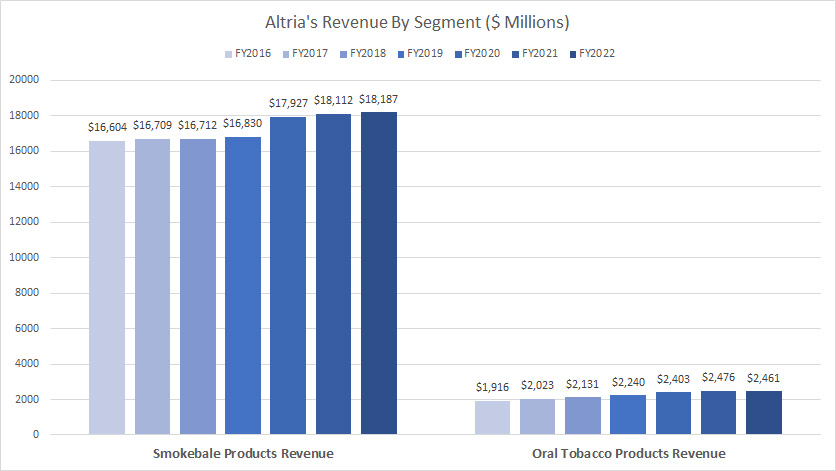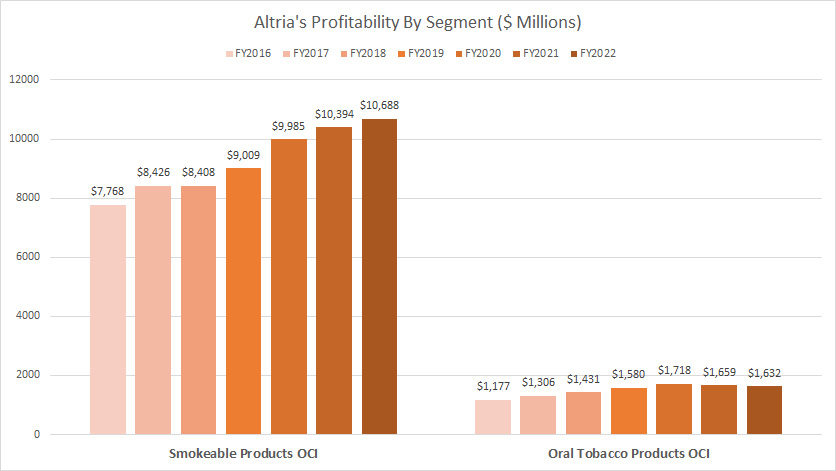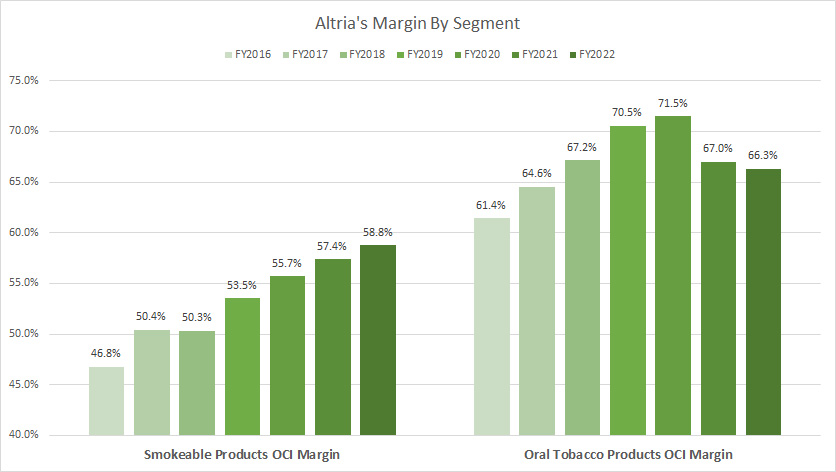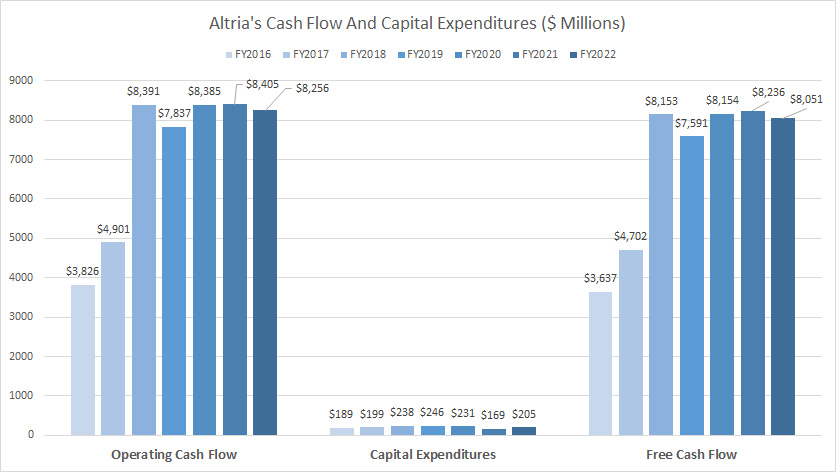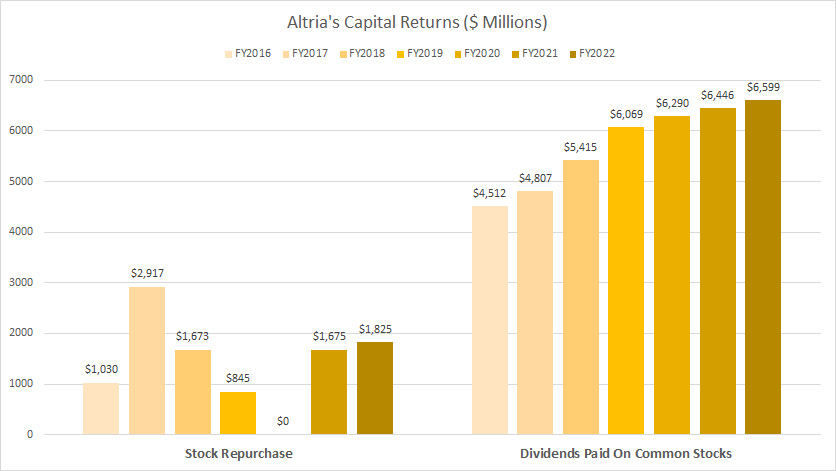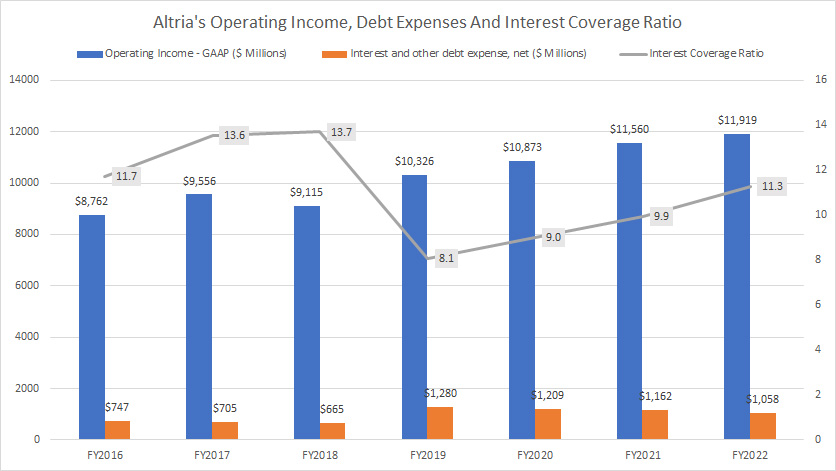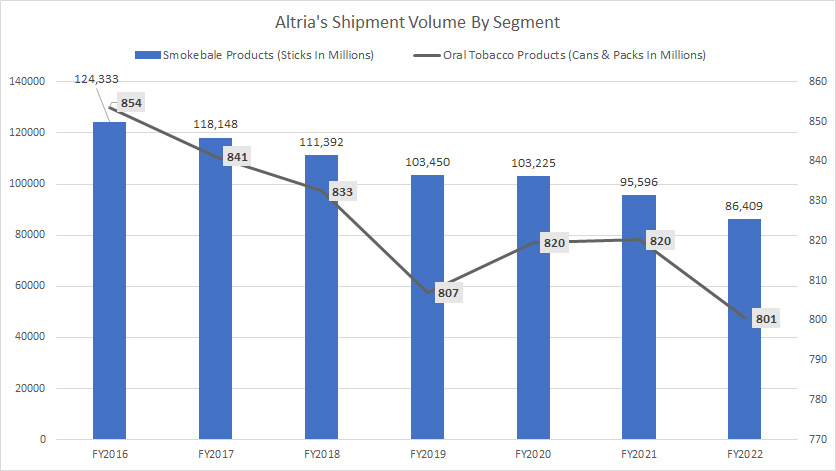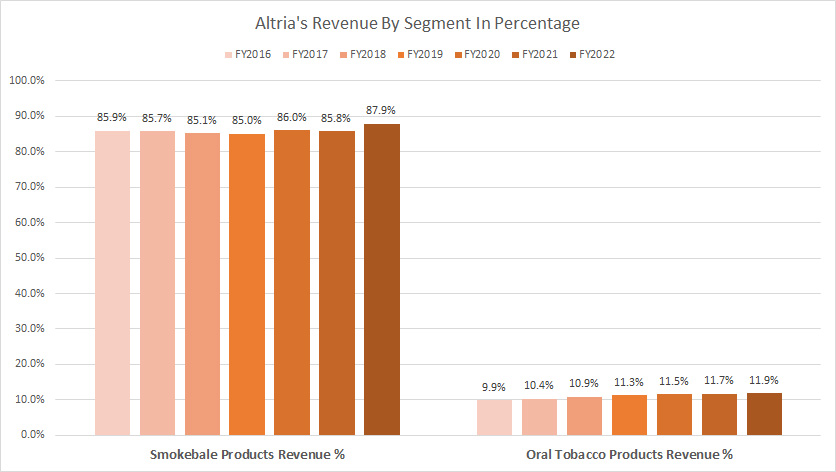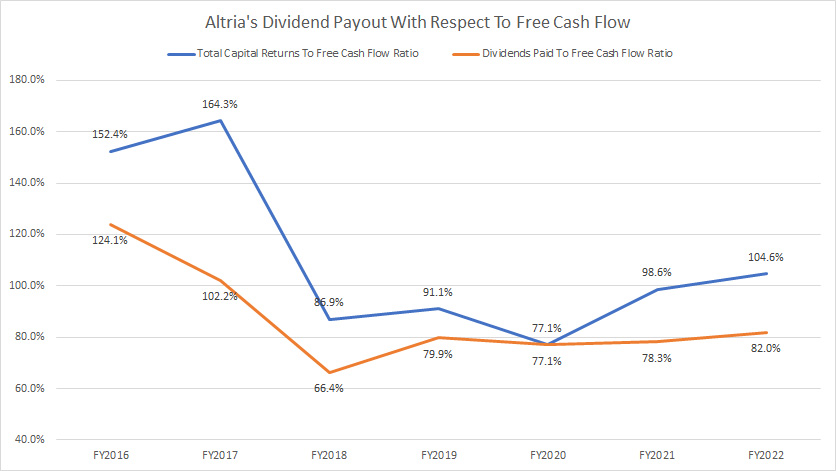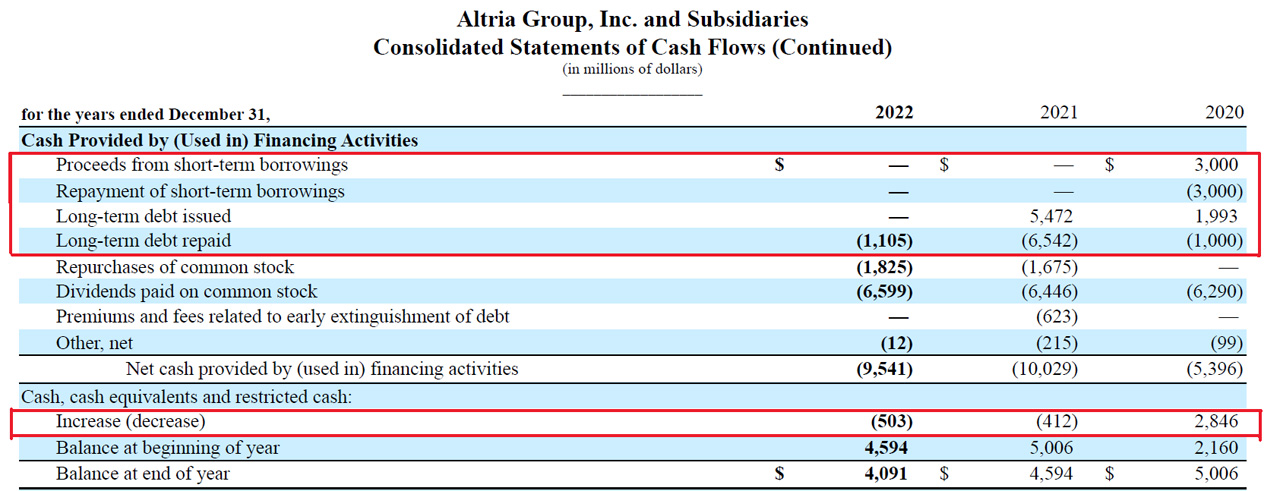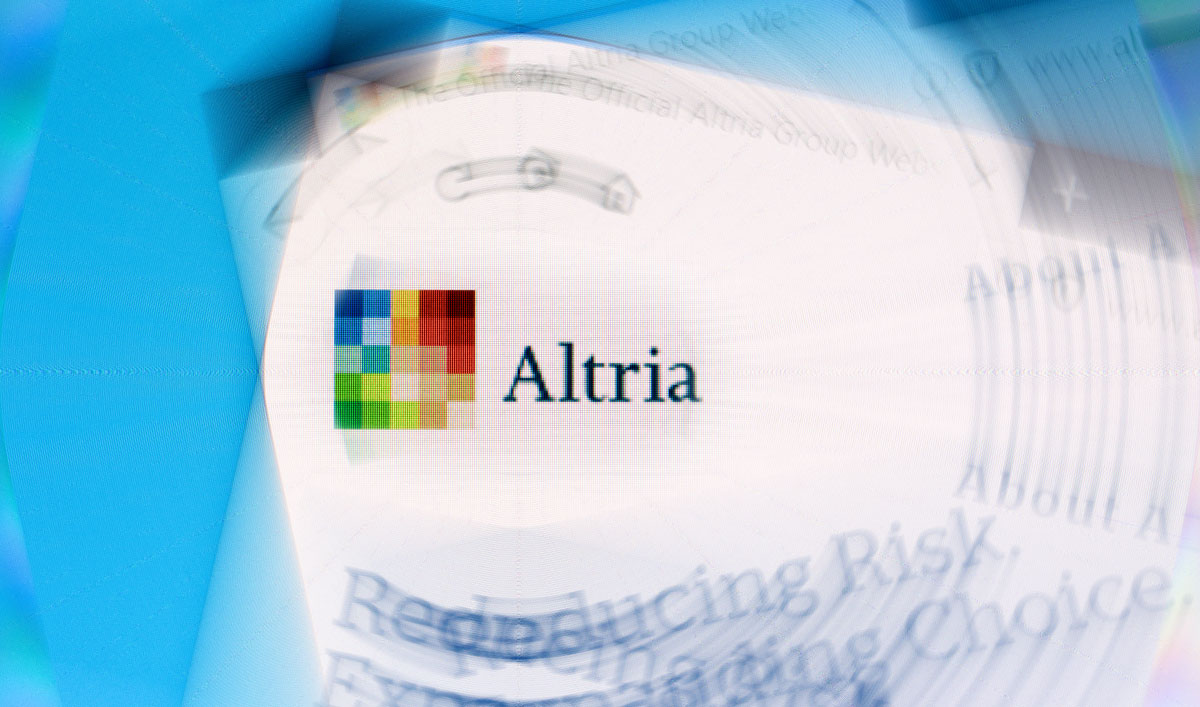
Altria Group. Flickr Image.
Altria Group (NYSE:MO) is a company that pays cash dividends. According to the company’s dividend information page, it has been paying cash dividends continuously since 1989.
As of 2024, Altria has been a dividend-paying stock for over 30 years. Remarkably, Altria has increased its dividend rates year over year for the past ten years, demonstrating its strong commitment to returning as much cash as possible to its shareholders.
In addition to paying substantial cash dividends, Altria also conducts significant stock buybacks, averaging over USD 1 billion annually. Although the company temporarily suspended its stock buyback program in fiscal 2020, it resumed in the first quarter of fiscal 2021.
In fiscal 2022 alone, Altria spent nearly $2 billion on stock buybacks and more than $6 billion on cash dividends, underscoring its firm capital return policy for shareholders.
This article examines various factors that support Altria’s dividend policy, highlighting the reasons behind the company’s consistent ability to pay and increase dividends. Additionally, we explore the unfavorable factors that could negatively impact the dividends and potentially make them less secure.
Let’s get into the details!
Investors looking for other statistics of Altra Group may find more resources on these pages:
- Altria vs Philip Morris International in profit margins,
- Altria liquidity, and
- Altria profit margins.
Please use the table of contents to navigate this page.
Table Of Contents
Favorable Factors
A1. Rising Revenue
A2. Highly Profitable Company
A3. Expanding Margins
A4. Postive Cash Flow And Low Capital Expenditures
A5. Solid Capital Returns
A6. Manageable Debt Payments
A7. Comfortable Interest Coverage
Unfavorable Factors
B1. Declining Shipment Volume
B2. Still A Cigarette Company
B3. High Payout Ratio
B4. An Overstretched Cash Flow
Conclusion And Reference
S1. Conclusion
S2. References and Credits
S3. Disclosure
Rising Revenue
Altria revenue by segment
(click image to enlarge)
While revenue growth doesn’t always equate to profitability and thus cash dividends, it’s promising to see that Altria has managed to increase its revenue. More importantly, the company has seen significant revenue growth in its two major segments: smokeable products and oral tobacco products.
As shown in the chart above, since 2016, Altria’s smokeable products revenue has grown by 10%, while the oral tobacco products revenue has surged by an impressive 28% over the same period.
In 2022, Altria’s smokeable product revenue reached a record US$18.2 billion, and its oral tobacco product revenue hit US$2.5 billion, also a record for the past seven years. A noteworthy trend is Altria’s ability to achieve meaningful revenue growth despite declining cigarette sales.
Again, while rising revenue may not necessarily guarantee a safe dividend, a stable and solid cash dividend is more likely when a company can raise prices and generate long-term revenue growth.
Highly Profitable Company
Altria profitability by segment
(click image to enlarge)
Profitability is one of the most crucial factors in determining a company’s ability to pay cash dividends. Fortunately, Altria isn’t just profitable — it’s highly profitable.
As shown in the chart above, Altria’s smokeable and oral tobacco segments are very profitable, with annual operating income exceeding $10 billion and $1.6 billion, respectively.
Moreover, the profitability of these business segments is both consistent and rising, indicating a positive trend and stability in their financial performance.
For instance, since 2016, Altria’s smokeable product operating company income (OCI) has increased by an impressive 37%, while the OCI for oral tobacco products has risen even more, by 39%.
With consistent and rising profits from its primary business operations, Altria’s case for offering safe and stable dividends becomes even stronger.
Expanding Margins
Altria margin by segment
(click image to enlarge)
Altria’s expanding margins in both the smokeable product and oral tobacco product segments reinforce its position as a solid dividend payer. Increasing margins mean the company is earning more profit for the same revenue, effectively boosting profitability.
For example, Altria’s smokeable segment boasts an OCI margin above 59%, while the oral tobacco segment is even more impressive, with an OCI margin exceeding 60%. With such exceptional margins, Altria’s ability to provide consistent and safe dividends is highly likely.
Positive Cash Flow And Low Capital Expenditures
Altria cash flow and capital expenditures
(click image to enlarge)
Discussing dividends without considering cash flow would be incomplete, as dividends are directly sourced from cash flow. Fortunately, Altria consistently generates impressive cash flow, providing shareholders with confidence.
According to the chart above, Altria’s net cash from operations exceeds $8 billion annually. From that $8 billion, Altria manages to convert up to 98% into free cash flow, thanks to its low capital expenditures.
Free cash flow is crucial for debt repayments, business expansion, capital returns, and more. The substantial free cash flow has enabled Altria to pay cash dividends and consistently raise the rates each year.
Solid Capital Returns
Altria capital returns
(click image to enlarge)
Altria has a robust capital return policy for shareholders. Its practice of increasing the dividend payout each year is particularly impressive. As illustrated in the chart above, Altria’s cash dividend payout has surged by 46% since fiscal 2016, reaching an impressive $6.6 billion in 2022, up from $4.5 billion in 2016.
Beyond paying dividends, Altria has also spent an average of $1.4 billion annually on share buybacks since 2016. In 1Q 2023, Altria’s board approved a new $1 billion share repurchase program, expected to be completed by December 31, 2023, according to the company’s 1Q 2023 10-Q report. This consistent capital return policy underscores Altria’s commitment to providing sound and secure dividend payments to its shareholders.
Manageable Debt Payments
Altria debt maturities
(click image to enlarge)
Altria carries quite a significant amount of debt according to this article – Altria Debt, Cash, Liquidity, And Payments Due Date. As of 1Q 2023, Altria’s debt levels amounted to $25 billion, a considerable prominent figure compared to the historical average.
While the debt figure may be huge, Altria can handle the debt repayments. As shown in the snapshot above, between 2023 and 2027, Altria’s debt will come in at $1.4 billion on average every year in the next five years.
Despite the seemingly gigantic debt figure, Altria’s cash and cash equivalents alone should easily cover the amount.
Altria’s cash equivalents & restricted cash
| Fiscal Year | Cash In Millions |
|---|---|
| 2016 | $4,569 |
| 2017 | $1,314 |
| 2018 | $1,433 |
| 2019 | $2,160 |
| 2020 | $5,006 |
| 2021 | $4,594 |
| 2022 | $4,091 |
| 2023 1Q | $3,974 |
| 2023 2Q | $923 |
| 2023 3Q | $1,581 |
| — | — |
| Average | $3,000 |
As shown in the table above, Altria’s cash on hand averaged $3 billion, and it boasted $1.6 billion as of 3Q 2023.
Therefore, Altria’s debt should not threaten its generous dividend policy.
Comfortable Interest Coverage
Altria operating income, debt expenses, and interest coverage ratio
(click image to enlarge)
Apart from being able to repay its debt, Altria can also service its debt. The chart above shows that Altria’s operating income is far more significant than the interest and other debt expenses.
In fact, Altria’s interest coverage ratio, measured by dividing the operating income by interest and debt expenses, is many times above the interest and debt expenses.
Therefore, Altria should have no problem servicing its debt. Again, Altria’s debt and interest payments do not hinder the company’s dividend policy.
Declining Shipment Volume
Altria shipment volume by segment
(click image to enlarge)
Altria’s declining shipment volumes pose a challenge to its dividend policy. Over the years, the company has seen consistent declines in shipment volumes for both smokeable and oral tobacco products.
As indicated in the chart above, Altria’s shipment volumes hit record lows in fiscal 2022 for these segments. Lower shipment volumes translate to reduced revenue and potentially smaller dividends.
To offset the declining shipment volumes, Altria has been raising prices. However, relying solely on price increases may not be a sustainable solution for the company’s declining shipment volumes.
As a result, Altria’s decreasing shipment volumes could jeopardize its ability to maintain consistent dividend payments.
Altria Is Still A Cigarette Company
Altria revenue by segment in percentage
(click image to enlarge)
As of 2022, despite efforts to diversify, Altria remained primarily a cigarette company. As shown in the chart above, Altria’s smokeable product segment still accounted for the lion’s share of the company’s sales, at 88% as of 2022.
The company’s smokeable product segment mainly consists of cigarettes and cigars. Revenue from other segments has barely progressed over the years. Altria has attempted to diversify into areas such as cannabinoids, e-cigarettes, and alcohol, but these ventures have not significantly impacted the company’s financials.
In fact, some of these diversification efforts have resulted in considerable losses. Therefore, Altria continues to rely heavily on its traditional cigarette segment for growth and profitability.
To ensure long-term success, Altria needs a new growth engine as its legacy cigarette business declines. If Altria continues to depend on its traditional cigarette business, its dividends may suffer the same fate.
High Payout Ratio
Altria dividend payout ratio
(click image to enlarge)
Altria has a remarkable track record of consistently increasing its dividend rates for years. However, this practice may not be sustainable in the long run, given the high dividend payout ratio. As shown in the chart above, Altria’s payout ratio relative to free cash flow is quite high, exceeding 70%.
In fact, the figure reached over 80% in 2022. When accounting for the cash spent on share buybacks, the ratio becomes even higher. This high payout ratio might pose a risk to the sustainability of Altria’s dividend increases in the future.
In fiscal 2022, Altria’s total capital return exceeded its free cash flow, thereby causing the payout ratio to exceed 100%, as summarized in this article – Altria Free Cash Flow Vs Capital Returns.
Unless Altria can significantly boost its free cash flow, the continuous growth of dividend rates may become unsustainable in the future.
An Overstretched Cash Flow
Altria debt repayment and capital return
(click image to enlarge)
Based on the cash flow statements, it does appear that Altria’s cash flow might be overstretched.
The highlighted sections show Altria’s debt borrowings and repayments, as well as changes in its cash balance. The snapshot indicates that Altria’s cash balance increases when it borrows more and halts stock buybacks, bringing in more cash.
Conversely, Altria’s cash balance decreases when it repays debt, buys back stocks, and pays dividends.
Therefore, Altria faces a choice: reduce share buybacks, cut dividends, or increase borrowing to boost cash reserves.
If Altria continues to pay dividends and buy back its stocks, it may not have enough cash for debt repayment and vice versa.
In this scenario, Altria would need to turn to the capital market to refinance its debt, potentially exceeding its cash flow capacity if it tries to return cash to shareholders and repay debt simultaneously.
Summary
In summary, Altria has a strong history of paying and increasing dividends, supported by robust cash flow and capital return policies. However, its reliance on traditional cigarette sales and high payout ratios could pose risks to the sustainability of these dividends in the long term.
References and Credits
1. All financial figures presented in this article were obtained and referenced from Altria’s quarterly and annual filings published in the company’s official website – Altria Investor Relations.
2. Flickr Images.
Disclosure
References and examples such as tables, charts, and diagrams are constantly reviewed to avoid errors, but we cannot warrant the total correctness of all content.
The content in this article is for informational purposes only and is neither a recommendation nor a piece of financial advice to purchase a stock.
If you find the information in this article helpful, please consider sharing it on social media and provide a link back to this article from any website so that more articles like this can be created in the future.
Thank you!

